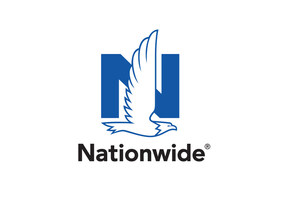COLUMBUS, Ohio, Oct. 9, 2017 /PRNewswire/ -- One company became a victim when a cybercriminal infected it with a ransomware virus, taking its servers hostage and holding them for ransom.
Another business was attacked by an organized gang of cybercriminals that planned a complex social engineering scheme to steal customer credit card information by impersonating a third-party vendor and installing malware.
Such attacks are becoming more common and can potentially cripple a company's work and reputation — forcing them to pay hundreds to thousands of dollars. While both businesses experienced different forms of cyberattacks, they survived in part because having cyber coverage from Nationwide provided them with the necessary resources that enabled them to have quicker recovery time and fewer expenses than if they had to go it alone.
According to Nationwide's third annual survey of 1,069 business owners with 1-299 employees, more than 20 percent of cyberattack victims spent at least $50,000 and took longer than six months to recover. But 7 percent spent more than $100,000, and 5 percent took a year or longer to rebuild their reputation and customer trust.
"Cyberattacks are one of the greatest threats to the modern company," said Mark Berven, president of Property & Casualty for Nationwide, the No. 1 total small-business insurer[1] in the country. "Business owners are telling us that cybercriminals aren't just attacking large corporations on Wall Street. They're also targeting smaller companies on Main Street that often have fewer defense mechanisms in place, less available capital to re-invest in new systems and less name recognition to rebuild a damaged reputation."
Nationwide's survey found that 13 percent of business owners said they experienced a cyberattack. However, that number jumped to 58 percent total when owners were shown a list of the following types of attacks — revealing a 45 percent gap and lack of understanding about what constitutes an actual attack:
- Computer virus: 36 percent
- Phishing: 29 percent
- Trojan horse: 13 percent
- Hacking: 12 percent
- Data breach: 7 percent
- Ransomware: 7 percent
- Issues due to unpatched software: 7 percent
- Unauthorized access to company info: 7 percent
- Unauthorized access to customer info: 6 percent
Part of the problem facing a business' ability to recover from an attack is that a majority of owners are not prepared. In fact, 57 percent of owners do not have a dedicated employee or vendor monitoring for cyberattacks — and therefore, could be victims without even knowing it.
Further, most don't have a cyberattack response plan in place (76 percent), a plan in place to protect employee data (57 percent) or a plan to protect customer data (54 percent). Threats continue to grow as more companies are now frequently using new technologies such as the Internet of Things (37 percent) and Artificial Intelligence (24 percent) in a potentially unprotected environment.
While the vast majority of business owners say it's important to establish cybersecurity best practices recommended by the U.S. Small Business Administration, fewer report actually following those best practices:
- Protect against viruses, spyware and other malicious code: 85 percent versus 65 percent
- Secure your networks: 85 percent versus 58 percent
- Make backup copies of important business data and information: 85 percent versus 59 percent
- Establish security practices and policies to protect sensitive information: 83 percent versus 50 percent
- Control physical access to computers and network components: 81 percent versus 60 percent
- Require employees to use strong passwords and to change them often: 80 percent versus 52 percent
- Educate employees about cyber threats and hold them accountable: 76 percent versus 42 percent
- Protect all pages on public-facing websites, not just the checkout and sign-up pages: 74 percent versus 42 percent
- Employ best practices on payment cards: 73 percent versus 47 percent
- Create a mobile device action plan: 64 percent versus 26 percent
For more information, visit Nationwide's blog page, take the cyber insurance quiz and review the cyber product pages for both Standard Commercial and Excess & Surplus/Specialty. You can also access more tips and resources during National Cyber Security Awareness Month.
Methodology
Nationwide commissioned a 20-minute, online survey among a sample of 1,069 U.S. small business owners. Small business owners are defined as having between 1-299 employees, 18 years or older, and self-reported being a sole or partial owner of their business. The margin of error for this sample is +/-3% at the 95% confidence level. Conducted by Edelman Intelligence, a full-service consumer research firm, the survey was fielded between May 16-24, 2017. As a member of CASRO in good standing, Edelman Intelligence conducts all research in accordance with Market Research Standards and Guidelines.
About Nationwide
Nationwide, a Fortune 100 company based in Columbus, Ohio, is one of the largest and strongest diversified insurance and financial services organizations in the U.S. and is rated A+ by both A.M. Best and Standard & Poor's. The company provides a full range of insurance and financial services, including auto, commercial, homeowners, farm and life insurance; public and private sector retirement plans, annuities and mutual funds; banking and mortgages; excess & surplus, specialty and surety; pet, motorcycle and boat insurance. For more information, visit www.nationwide.com.
Nationwide, Nationwide is on your side, and the Nationwide N and Eagle are service marks of Nationwide Mutual Insurance Company.
[1] Conning, 2014; Conning Strategic Study: The Small Business Sector for Property-Casualty Insurance: Market Shift Coming.
Contact:
Christopher Stollar
614-677-5711
[email protected]
SOURCE Nationwide
Related Links
WANT YOUR COMPANY'S NEWS FEATURED ON PRNEWSWIRE.COM?
Newsrooms &
Influencers
Digital Media
Outlets
Journalists
Opted In





Share this article